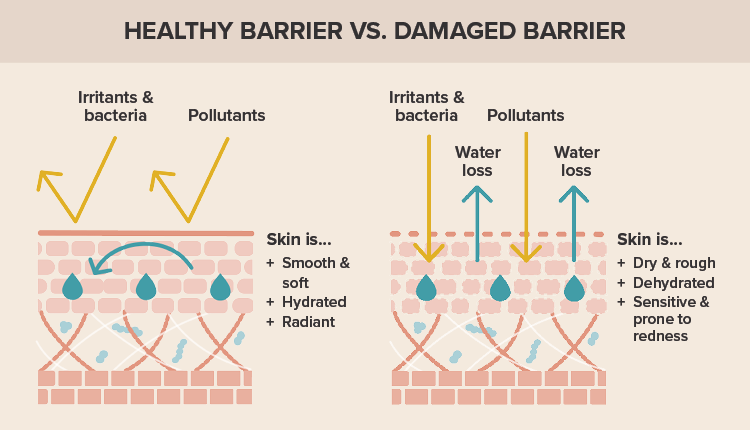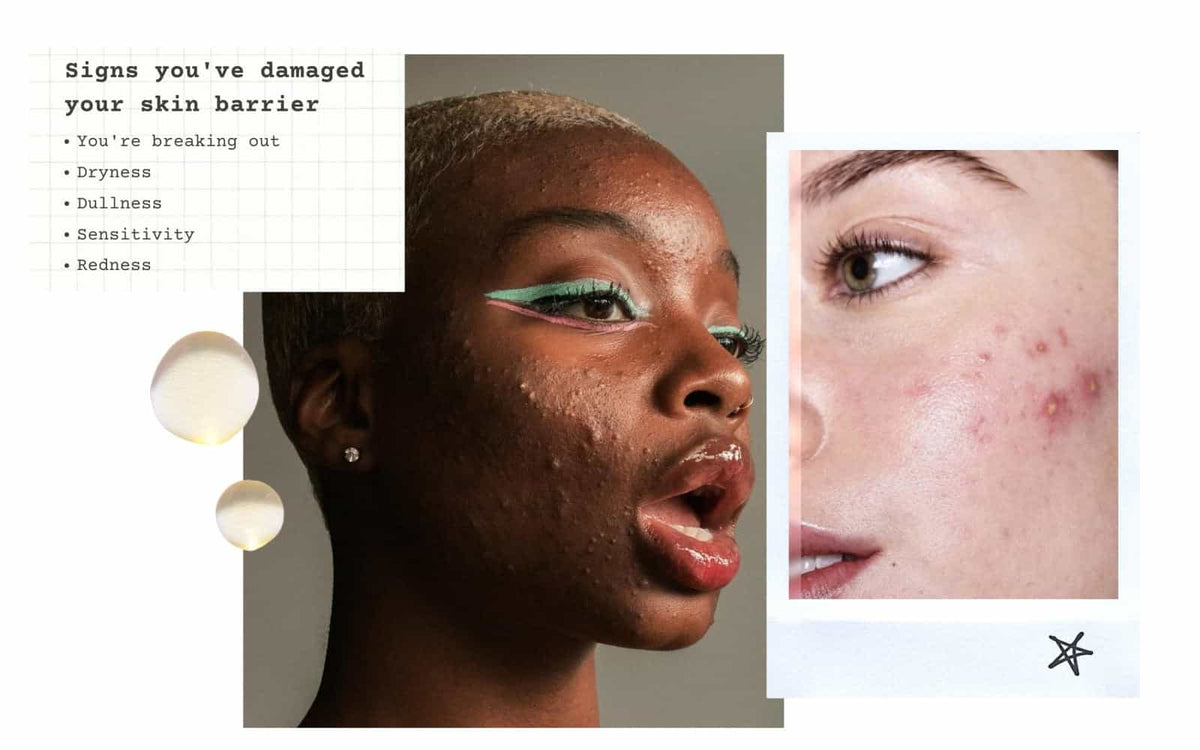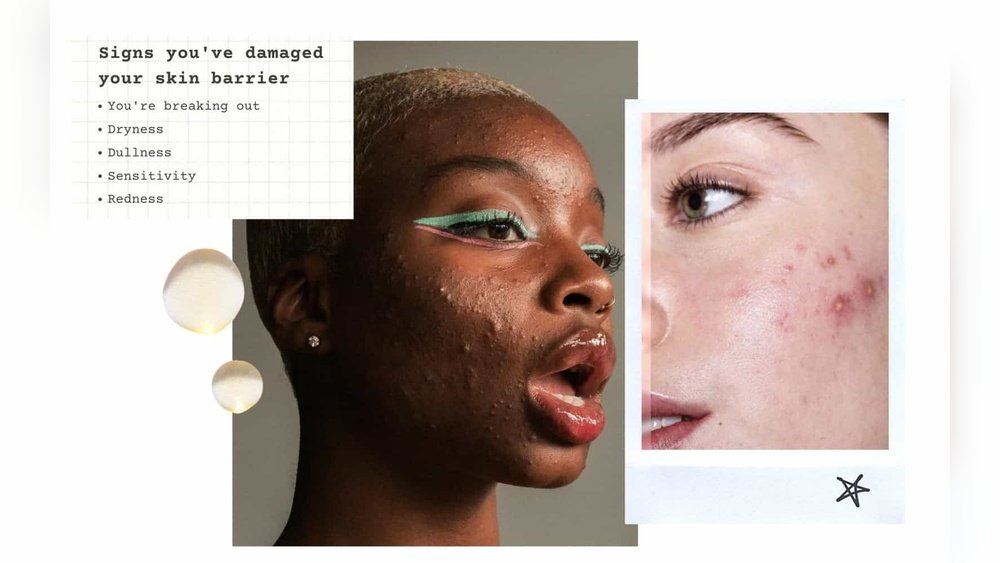Do you ever notice your skin feeling extra sensitive, dry, or irritated for no clear reason? These could be signs that your skin barrier is damaged.
Your skin barrier acts like a shield, protecting you from harmful elements and locking in moisture. When this barrier weakens, your skin starts to show warning signals like redness, flakiness, tightness, or even sudden breakouts. If you’re wondering whether your skin is struggling and what to do about it, keep reading.
Understanding these signs will help you take the right steps to heal your skin and restore its natural glow. Don’t ignore the clues your skin is sending—you deserve healthy, comfortable skin every day.

Credit: www.bareluxeskincare.com
Signs Of Increased Sensitivity
Increased sensitivity is a key sign that your skin barrier might be damaged. It means your skin reacts more easily to touch, products, or the environment. This change can make daily skincare uncomfortable and frustrating.
When sensitivity rises, your skin may feel irritated without clear cause. Understanding these signs helps you protect your skin and choose better care methods.
Burning And Stinging Sensations
A common sign of increased sensitivity is burning or stinging. Even mild products may cause these unpleasant feelings. This happens because the skin barrier is weak and lets irritants enter more easily.
Itching And Irritation
Your skin may itch frequently and feel irritated. These sensations show that the skin is struggling to defend itself. Itching can lead to scratching, which worsens the damage.
Redness And Flushing
Redness appears more often and lasts longer. The skin may look flushed or blotchy without clear reasons. This happens as the skin barrier fails to protect against inflammation.
Quick Reaction To Products
Products that were once safe might suddenly cause discomfort. Your skin may react with redness, burning, or tightness after applying skincare or makeup. This is a sign of barrier sensitivity.
Sensitivity often comes with dryness and tightness. The skin loses moisture faster and feels uncomfortable. This dryness weakens the barrier further, creating a cycle of irritation.
Redness And Inflammation
Redness and inflammation are common signs of a damaged skin barrier. This damage weakens the skin’s defense, causing it to react easily. The skin looks red and feels warm or irritated. These symptoms often appear after exposure to harsh products or environmental stress.
When the barrier is compromised, the skin cannot protect itself well. This leads to inflammation, a natural response to injury or irritation. Persistent redness signals the skin is struggling to heal and defend itself. Understanding these signs helps in choosing the right care to calm the skin.
What Causes Redness And Inflammation?
Harsh skincare ingredients can strip away natural oils. Over-washing or exfoliating too much also damages the barrier. Environmental factors like sun, wind, or pollution add stress. Allergens and irritants may trigger redness and swelling. Sensitive skin reacts quickly to these triggers.
How To Recognize Persistent Redness
Look for redness that does not fade after a few hours. The skin may feel hot or tender to touch. Small bumps or patches can appear along with swelling. This type of redness differs from temporary flushing or blushing. It shows the skin barrier needs repair.
Effects Of Inflammation On Skin Health
Inflammation breaks down skin cells and slows healing. It can cause dryness and rough texture over time. Constant inflammation weakens the skin’s ability to hold moisture. This leads to more sensitivity and discomfort. Early care helps reduce long-term damage.
Dryness And Tightness
Dryness and tightness are key signs that your sensitive skin barrier is damaged. The skin loses its ability to hold moisture, causing discomfort. This feeling can range from mild dryness to severe tightness that limits facial movement.
These sensations often appear after exposure to harsh weather or skincare products. Dry skin can look dull and flaky, signaling the barrier is not working properly. Tightness usually occurs because the skin is losing its natural oils and hydration.
What Causes Dryness In Sensitive Skin?
Dryness happens when the skin barrier cannot keep water inside. Harsh soaps, hot water, and cold wind strip away natural oils. Sensitive skin is more vulnerable to these factors. Without enough oil, the skin feels rough and dry.
How Tightness Feels On Your Skin
Tightness feels like your skin is shrinking or pulling. It often occurs after washing or during cold weather. This sensation shows your skin barrier is weak. The skin may also crack or peel if tightness lasts long.
Why Moisturizers Sometimes Do Not Help
Moisturizers work best when the skin barrier is healthy. If the barrier is damaged, the skin cannot absorb moisture well. Applying moisturizer might not relieve tightness or dryness. Instead, look for gentle products that repair the barrier first.
Flakiness And Rough Texture
Flakiness and rough texture are common signs of a damaged skin barrier, especially in sensitive skin. These symptoms show that the skin is struggling to stay healthy and smooth. The skin may lose its natural moisture and protection, leading to dry, flaky patches and a rough feel.
When the skin barrier breaks down, it cannot keep moisture inside. This causes the skin to become dry and flaky. The surface may feel uneven or rough to the touch. These changes make the skin look dull and unhealthy.
What Causes Flakiness And Rough Texture?
Flakiness happens when dead skin cells build up on the surface. Normally, the skin sheds these cells gently. A damaged barrier slows down this process, causing flakes to appear. Rough texture comes from the loss of moisture and damage to the skin’s outer layer.
How To Recognize Flaky And Rough Skin
Look for small, dry flakes on your face or body. Your skin might feel tight or rough, especially after washing. The skin may also become more sensitive or irritated. These signs suggest the barrier needs care and repair.
Tips To Improve Flakiness And Rough Texture
Use gentle cleansers that do not strip the skin of oils. Apply moisturizers that restore hydration and support the skin barrier. Avoid harsh exfoliants that can worsen flakiness. Protect your skin from extreme weather or irritants to help it heal faster.
Dullness And Uneven Tone
Dullness and uneven tone are common signs of a damaged skin barrier. The skin may lose its natural glow and appear tired. This happens because the barrier cannot protect the skin properly. Dirt and pollutants can easily penetrate, causing the skin to look dull and uneven. When the skin barrier is weak, it struggles to keep moisture inside. This results in dry patches and rough texture that make the skin look lifeless. Uneven skin tone may develop due to inflammation and damage. The skin may show red or dark spots that stand out.
Dullness: The Lack Of Natural Glow
Dull skin lacks brightness and looks tired. A healthy skin barrier helps maintain a fresh, radiant look. When damaged, the skin cannot shed dead cells well. These dead cells build up on the surface. This buildup blocks light reflection, making the skin look dull. The skin also loses its smooth texture. Dullness makes the face appear older and less vibrant.
Uneven Tone: Spots And Discoloration
Uneven tone shows as patches of different colors on the skin. A damaged barrier causes inflammation and irritation. This leads to redness and dark spots. The skin struggles to heal itself properly. The result is blotchy and inconsistent skin color. Uneven tone can lower confidence and cause frustration. It also signals that the skin needs help to repair.
How Dullness And Uneven Tone Affect Sensitive Skin
Sensitive skin is more prone to barrier damage. It reacts quickly to harsh products and environments. Dullness and uneven tone are more noticeable on sensitive skin. The skin feels tight, uncomfortable, and looks unhealthy. Repairing the barrier is key to restoring brightness and evenness. Gentle care and hydration help bring back the skin’s natural beauty.

Credit: www.paulaschoice-eu.com
Unexpected Breakouts
Unexpected breakouts can signal that your sensitive skin barrier is damaged. The skin barrier acts as a shield, protecting your skin from bacteria and irritants. When this barrier weakens, pores can clog easily, leading to sudden acne or pimples. These breakouts often appear without warning and can be frustrating to manage.
Damage to the skin barrier disrupts its natural balance. This causes the skin to produce more oil as a defense mechanism. Excess oil mixes with dead skin cells and bacteria, blocking pores. The result is inflammation and blemishes that seem to appear out of nowhere.
How Breakouts Indicate Barrier Damage
Breakouts on sensitive skin often come with redness and irritation. These symptoms show the barrier is not protecting well. Your skin becomes vulnerable to environmental stressors and harmful microbes. This vulnerability allows acne-causing bacteria to multiply quickly.
Why Sensitive Skin Reacts Strongly
Sensitive skin has a thinner or weaker barrier than normal skin. This condition makes it prone to inflammation and breakouts. Gentle care is crucial to avoid worsening the damage. Using harsh products can strip oils and worsen the barrier’s condition.
Steps To Calm Unexpected Breakouts
Cut back on strong exfoliants and active ingredients. Focus on moisturizing and soothing products instead. Look for ingredients like ceramides and hyaluronic acid to restore the barrier. Avoid touching or picking at breakouts to prevent further irritation.

Credit: perlcosmetics.com
Frequently Asked Questions
How Do I Know If I Damaged My Skin Barrier?
Signs of a damaged skin barrier include redness, dryness, flakiness, increased sensitivity, burning, tightness, rough texture, and sudden breakouts. Your skin may also appear dull and react negatively to products that once worked well.
Can Azelaic Acid Damage The Skin Barrier?
Azelaic acid rarely damages the skin barrier if used correctly. Overuse or high concentrations may cause dryness or irritation. Always start with low strength and moisturize well to protect your skin barrier.
Is Niacinamide Good For Skin Barrier?
Niacinamide strengthens the skin barrier by boosting ceramide production and reducing inflammation. It improves moisture retention and protects against damage.
Can Adapalene Damage The Skin Barrier?
Adapalene can irritate and weaken the skin barrier if overused or combined with harsh products. Use it gradually with moisturizers.
Conclusion
Damaged skin barriers show clear signs like redness and dryness. Your skin may feel tight, rough, or sting with products. Breakouts can appear even if you never had acne before. These symptoms tell you to treat your skin gently. Choose simple, soothing skincare to help repair and protect.
Avoid harsh chemicals and strong actives for a while. With care and patience, your skin can heal and glow again. Pay attention to your skin’s needs every day. Healthy skin starts with a strong, balanced barrier.
 Skip to content
Skip to content 